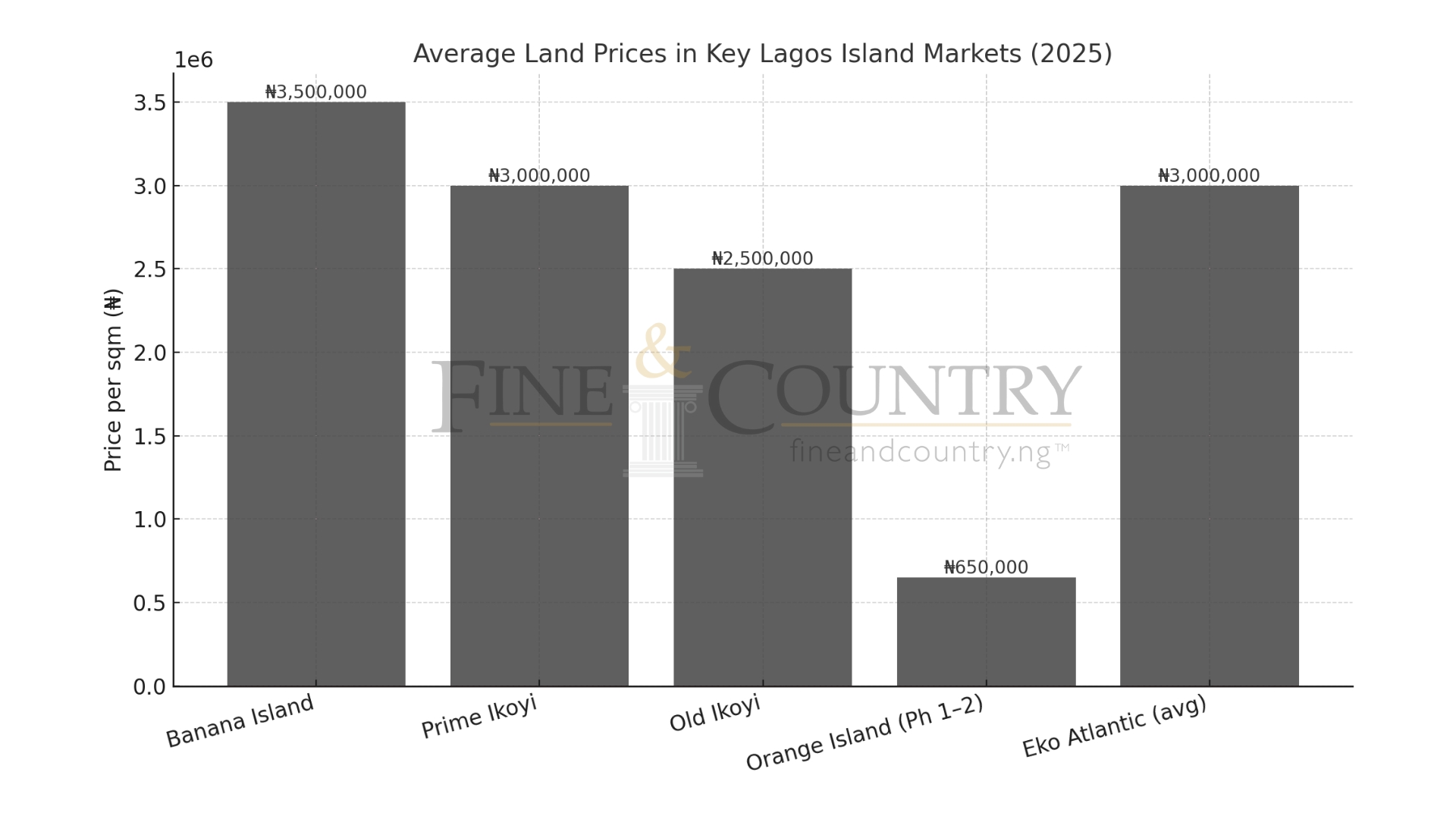
Banana Island: Nigeria’s Most Famous Address
Banana Island remains the country’s most recognisable postcode — a place where secure title, reliable utilities, and strict development controls protect its value. It is home to some of Nigeria’s most prominent business figures, celebrities, and political families, a neighbour profile that reinforces its global brand.
Land now trades at ₦3.5–₦4.5 million per sqm, with appreciation stabilising, making it primarily a capital preservation play. For many owner-occupiers, the draw is more about prestige, privacy, and quality of life than short-term yield. Many of our clients reference the “walkability” of the estate, showcasing the new key metric of wellness and comfort.
Yields on new purchases average 5–6%, but can be lifted through:
- Distressed acquisitions in prime spots.
- Securing rare frontage or corner plots.
- Building distinctive, climate-smart homes that stand out in a uniform market.
The appeal here is simple: you’re buying into the most famous address in Nigeria, where the brand value is upheld by its residents as much as its infrastructure — and that brand, more than anything else, is what keeps demand constant.
Ikoyi: Nigeria’s High-End Heartbeat
Ikoyi remains the most prestigious and liquid market in Nigeria’s luxury real estate segment — a district where corporate demand, diplomatic presence, and old-money heritage converge. Within its boundaries, two distinct markets have emerged: Prime Ikoyi (Bourdillon, Gerrard, Alfred Rewane, and the Banana Island periphery) and Old Ikoyi, the leafy enclave of colonial-era villas and quiet streets.
In Prime Ikoyi, land trades at around ₦3.0–₦3.5 million per sqm, supported by a steady pipeline of dollar-paying tenants from multinational corporations and foreign missions. Here, serviced apartments and high-spec builds are the mainstay, appealing to investors seeking predictable yields and low vacancy rates.
Old Ikoyi offers a different play — scarcity of land and heritage status are pushing owners toward 10–15 year land leases, joint ventures, and adaptive redevelopments. This creates a lower-capital entry point into some of the most coveted addresses in the country, provided investors can navigate title clarity, community relationships, and regulatory nuances.
For owner-occupiers, Ikoyi’s draw is the blend of prestige, centrality, and lifestyle — tree-lined streets, proximity to business hubs, and pockets of privacy that remain unmatched in Lagos.
Yields in Prime Ikoyi are typically in the 5–7% range but can be enhanced by:
- Securing units with efficient power, water, and drainage solutions to cut OPEX.
- Targeting older, underperforming assets for high-impact renovations.
- Locking in corporate leases with multi-year terms.
Ikoyi’s enduring value lies in its dual personality — a fast-moving, high-yield engine in Prime Ikoyi, and a patient, creative investment canvas in Old Ikoyi. Both share the same core advantage: unmatched liquidity in Nigeria’s high-end market.
Eko Atlantic: Nigeria's Engineered Frontier
Eko Atlantic is West Africa’s most ambitious new city — 10 million sqm of reclaimed land with engineered ground, sea defences, and plug-and-play utilities. Backed by a Free Zone framework, it’s fast becoming a future frontier for corporate headquarters, luxury residences, and mixed-use districts. The newly completed coastal road now links it seamlessly to Lekki, Victoria Island, and the wider business spine of Lagos, making it one of the most strategically connected locations in the city.
Pricing is highly stratified:
- Oceanfront: $3,000–$3,500/sqm
- Canal/Boulevard: $2,000/sqm
- Inner plots: $1,050–$1,250/sqm
High-profile entrants — from the largest U.S. consulate in the world to Nigeria’s first elite rugby boarding school — are anchoring the city’s identity and accelerating confidence in the market.
Absorption is naturally slower for a development of this scale, but each new institutional tenant and Grade A project helps set a firmer reference point for value. For investors, the play is long-term — targeting ESG-ready, mixed-use projects with premium tenants. For owner-occupiers, it’s a chance to secure a home in Lagos’ most deliberately planned and globally benchmarked waterfront district.
Orange Island: Lagos’ Infrastructure-First Growth Story
Orange Island is the value-growth play reshaping expectations for master-planned living on Lagos Island. Conceived as a public–private partnership with Lagos State, it is built on high elevation with underground drainage, controlled access, and clean title — an infrastructure-first approach designed to avoid the chaos of Lekki Phase 1.
Pricing reflects its phased delivery:
- Phases 1 & 2 resales: ₦650,000–₦800,000/sqm
- Phase 4 early access: ~₦450,000/sqm (Fine & Country curated cluster)
The appeal lies in early entry. Investors secure plots in a build-ready, design-coordinated environment that is still undervalued compared to Banana Island. Wide roads, water views in parts, and a framework for architectural harmony position it as one of the few Lagos Island districts where the streetscape — and long-term values — are being shaped from day one.
One recent buyer described standing on their plot at sunset and hearing nothing but the wind and distant water — a rare kind of quiet on Lagos Island that hints at the estate’s comfort and wellness potential.
The trade-off is time. Orange Island rewards 3–7 year holds, as density builds and the market fully prices in its location and quality. For buyers who prioritise structure over speculation, this is a rare opportunity to get in ahead of the curve.
Conclusion — Navigating Lagos Island’s New Price Reality
Lagos Island’s high-end land market is no longer a single, uniform play. Banana Island holds its place as Nigeria’s ultimate brand address, delivering security, prestige, and capital preservation. Prime Ikoyi continues to generate reliable dollar yields, while Old Ikoyi offers creative structures for those willing to engineer entry. Orange Island delivers infrastructure-first growth with a lifestyle edge, and Eko Atlantic stands as the frontier — a future skyline anchored by global-scale developments, strategic infrastructure like the coastal road, and institutional tenants.
The common thread is that buyers are now asking sharper questions — not just “where,” but “what will it return, how will it hold up, and how will it feel to live or work there?” The answers to those questions will shape the winners in Lagos real estate’s next cycle.